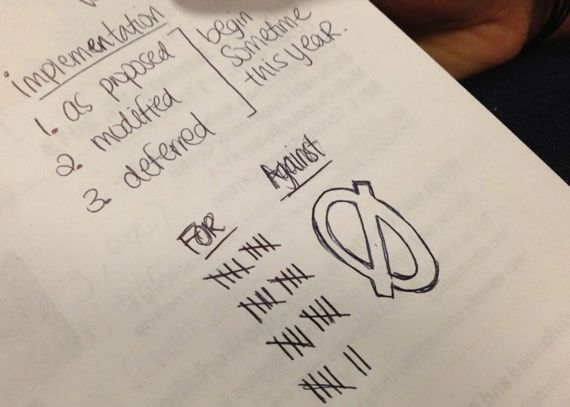"I'm lonely," a man half-jokingly testified at the LADOT's Public Hearing in support of the First Year Bike Lanes last Thursday night. "My friends find [riding in the street] terrifying."
Terror, safety, and loneliness seemed to be the major themes of the night for many of the 37 advocates that spoke in favor of implementation of the draft plans that would add several miles of bike lanes to Central and South L.A.
On behalf of fiancées, girlfriends, little sisters, partners, and friends -- male and female -- that were said to be "terrified" to ride streets that didn't have lanes, many of those offering comments asked the planners to not only implement the proposed lanes as quickly as possible, but to take extra steps to make sure they linked up to other lanes and were protected lanes wherever possible.
Making the streets feel safe and welcoming to women was of particular interest to a number of speakers. Several mentioned knowing women who wanted to ride or would sometimes ride where lanes were present, but who refused to risk taking their lives into their own hands where there was no such infrastructure, even when accompanied by experienced friends or partners.
As one cyclist explained, he might have convinced his fiancée to take a dedicated bike lane to work, but he was not able to ride with her and his little sister recreationally, such as to a USC game, because there weren't lanes connecting his home to the campus. He and other experienced riders felt that while the absence of bike lanes was manageable, having to constantly fight for space and endure harassment was frustrating and would be too intimidating for beginners. Most, they feared, would be afraid to try their hand at riding alone.
Others testified that it was precisely the existence of bike lanes had been instrumental in getting them to take their first rides in the street. One man from Los Feliz described how he began commuting by bike after observing lanes popping up around the neighborhood and realizing he could ride dedicated lanes the whole way to work.
Still, bike lanes alone are not enough to make people feel completely safe. Some speakers mentioned that even the green and buffered lanes downtown are conveniently disregarded when drivers have other priorities on their minds.
Protected lanes might be costly, said one man, referring to the presentation made by LADOT staff about the enhancements planned for Figueroa Ave., but the increased safety and the long-term benefits of encouraging more people to ride would outweigh them.
Finally, a number of people from the South L.A. community were on hand to speak about the importance of equity and the potential for creating healthier, family-friendly neighborhoods in under-served areas. Many more people in the area ride out of necessity than choice, the speakers explained, and they are just as deserving of infrastructure as everyone else, even if they aren't always able to be present at (or are even aware of) advocacy-related events or hearings.
But, that doesn't mean we can't also cultivate riders of choice in the area at the same time. Over the past year recreational riding in South L.A. has reached new heights, thanks to the activism of the clubs in the area. More infrastructure to support their work on the ground would hopefully encourage greater ridership while helping reduce the high incidences of collisions (and especially hit-and-runs) between bikes and cars. More recreational cycling in the area could also help increase the diversity of ridership in the city, suggested others, promoting positive connections within the neighborhoods and across communities.
Which is a shorthand way to say that bike lanes promote love -- a fitting message on Valentine's Day.
As the hearing broke up, people gathered to catch up and ask each other about the testimony they had given. Everyone seemed to feel the hearing had been a great success -- there hadn't been a single nay-sayer.
Just wait, the LACBC's Alek Bartrousof told me. Nay-sayers are very good at writing letters.
Which means that if you didn't get a chance to have your say at the hearing, you should think about submitting written comments in support of the project to planner David Somers (prior to March 4th) or attending the webinar on February 20th, the details of which can be found here. For more about the First Year Plan and Draft EIR, please click here.
**Thanks to the LADOT staff, the LACBC, TRUST South L.A., Multicultural Communities for Mobility, and all the attendees who took a few hours out of their Valentine's Day to show some love for their community. Thanks, too, to David Somers for having a good sense of humor and bringing chocolate to ease the pain of a planning meeting.







